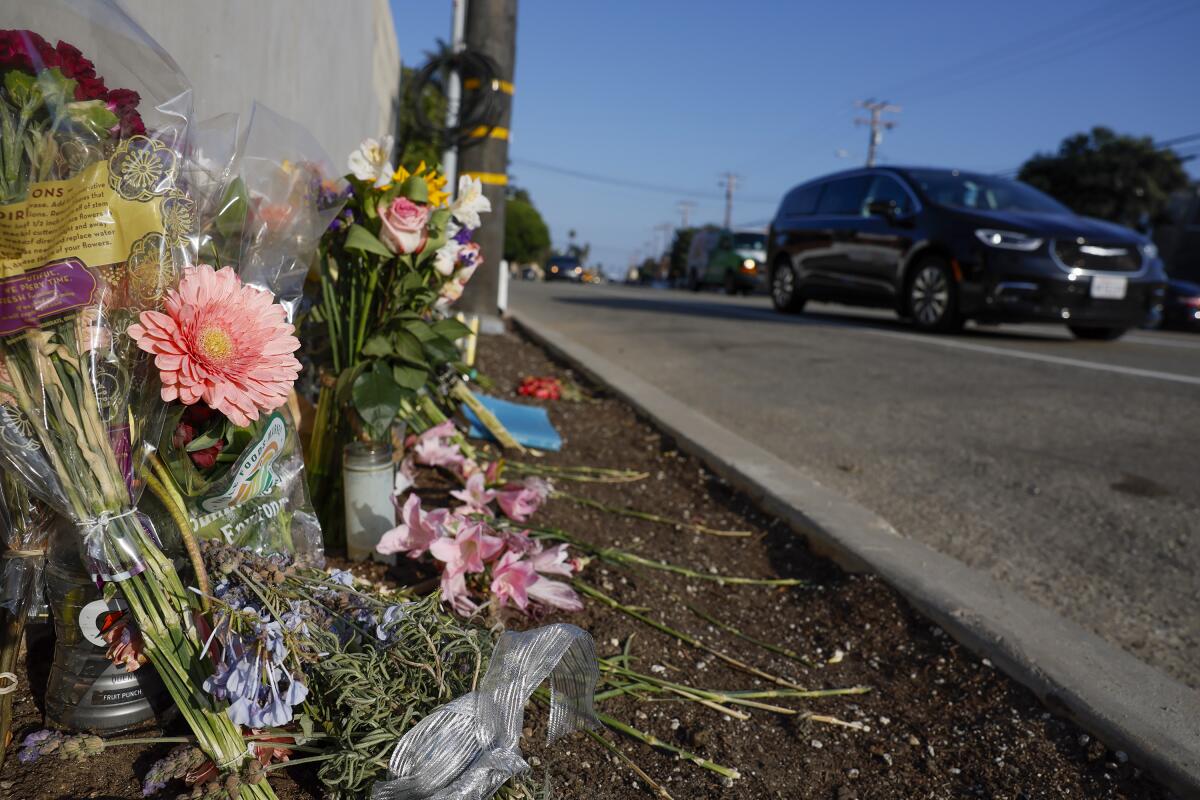
The families of the four Pepperdine University students who were struck and killed on Pacific Coast Highway last year and a fifth student who was injured in the incident have sued the local and state agencies they say are responsible for the deadly roadway.
In four separate lawsuits filed in the Santa Monica Courthouse, the families are collectively suing the state of California, the California Department of Transportation, the California Coastal Commission, Los Angeles County and the city of Malibu, arguing that the design of PCH is dangerous and officials failed to implement adequate safety measures. The injured student, Carlos Solloa, joined the lawsuit brought by the families of two of the students who were killed.
In October 2023, four seniors at Pepperdine who were Alpha Phi sorority sisters — Niamh Rolston, Peyton Stewart, Asha Weir and Deslyn Williams — were killed by a car traveling more than 100 mph that slammed into them as they were standing next to cars parked on a stretch of the roadway known as “Dead Man’s Curve.”
“For far too long, Pacific Coast Highway in Malibu has been — and continues to be — unsafe for pedestrians and drivers alike,” said attorneys for the plaintiffs in a joint statement, adding, “As a result of the defendants’ complacency, far too many lives have been needlessly lost.”
Spokespeople for the Coastal Commission and Caltrans said the agencies cannot comment on pending litigation.
“We understand the legal actions filed by the families in their pursuit of accountability, and the City respects their right to seek justice,” the city of Malibu said in a statement. “While we cannot comment on the specifics of ongoing litigation, we would like to reaffirm our longstanding commitment to improving safety on PCH for both residents and visitors alike.”
Santo Riccobono, who is representing Peyton Stewart’s mother, Carmela Stewart, told The Times, “Unfortunately in our society, it’s kind of the only way that we can affect change and really draw people’s attention to certain issues is with filing lawsuits.”
The city of Malibu approved a PCH Safety Study in 2015 that outlined 130 projects aimed at improving safety on the 21-mile stretch of the roadway.
“They’ve only completed seven of the 130,” Riccobono said. “We think that if they had actually completed all the projects that they set out to do, these girls would still be alive today.”
Carmela Stewart’s brother died in the World Trade Center on 9/11, Riccobono said, which led her and her husband to decide, “Life is short, we should have a baby.” That was Peyton.
“Her young daughter’s life was cut short and we want, we need change so this doesn’t happen to anyone else’s daughters moving forward,” he said.
The collision that took the lives of the four women and shocked the Malibu community was the deadliest pedestrian-vehicle crash in Los Angeles County since 2012, according to data from the Transportation Injury Mapping System at UC Berkeley.
Malibu has spent$39 million on traffic safety improvement projects along the roadway, including a bike route on Zuma Beach and an “arrester bed” to stop runaway vehicles. In addition, the city has added a crosswalk and traffic signal and made median and intersection improvements.
It also has $8 million set aside for a traffic signal synchronization project, which will coordinate the signals on PCH from Topanga Canyon Boulevard to John Tyler Drive. The project, which started in early 2023 and is set to be completed in 2025, will have the signals controlled by Caltrans’ Traffic Management Center.
This year Malibu has also invested in a public education campaign to get drivers to slow down when they travel on PCH.
In addition to the city’s efforts, Caltrans allocated $4.2 million last December to move forward on a draft list of 30 upgrades, including enhanced striping in curves, optical speed bars (stripes painted on the roadway at ever-shorter intervals to make drivers aware of their speed), speed feedback signs, speed limit markings on the pavement and replacement of safety corridor signs.
What the city and the Los Angeles County Sheriff’s Department Malibu/Los Hills station want are speed cameras, another tool that they contend will decrease driver’s speeds in the beachfront community.
Senate Bill 1297, which the Legislature approved this year and is awaiting Gov. Gavin Newsom’s signature, would allow the city of Malibu to install five camera systems to monitor the speed of drivers.